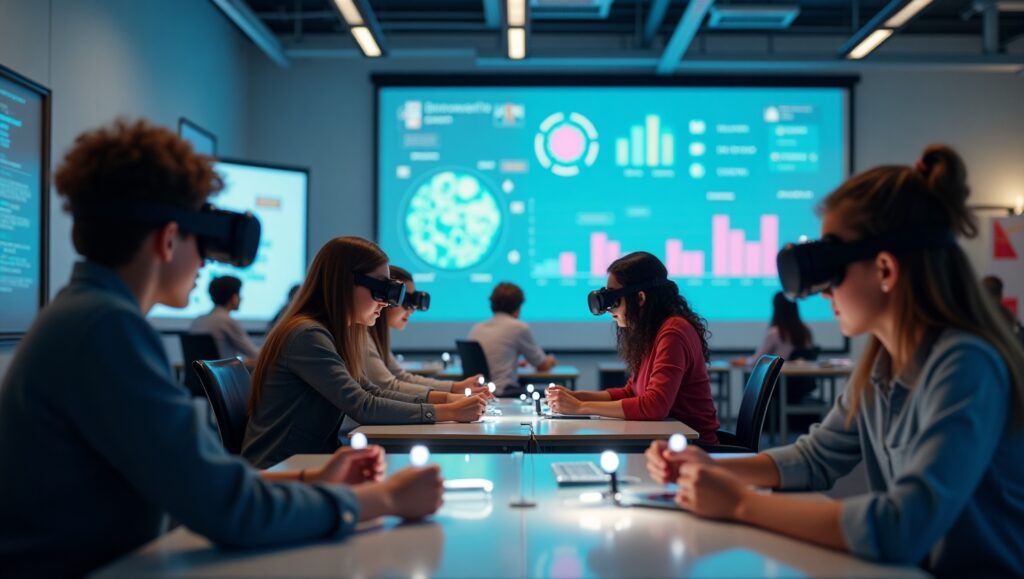Technology that once appeared to be the stuff of science fiction has rapidly integrated day by day. To be remaining competitive and innovative, it is necessary to be aware of technological advancement. These groundbreaking technologies are revolutionizing established industries while also giving rise to entirely new sectors.
Why Cutting-Edge Technologies Will Shape Your Career
The rapid evolution of technology is redefining the job market and industries. As a forward-thinking student, understanding the transformative power of these technologies offers a multitude of benefits that will propel your career and future success.

Stay Ahead of the Curve: Build a Future-Proof Career
Mastering emerging technologies gives you a competitive edge and the flexibility to adapt to an ever-changing job market.
An early adopter of cutting-edge fields can make you a sought-after talent, setting you apart from the competition.
Engaging with complex technologies enhances your critical thinking, problem-solving, and creative skills, making you a more valuable asset to employers.
By embracing future technologies, you’ll have the power to drive innovation, contribute to groundbreaking solutions, and shape the future of industries.
Investing in the knowledge and skills that will power the future is no longer a nicety, it’s a necessity.
Essential Future Technologies to Master by 2030
1. Artificial Intelligence (AI) and Machine Learning (ML)
AI and ML are leading the charge in technological advancement, revolutionizing industries by automating tasks, enabling predictive analytics, and improving decision-making processes. AI and ML are increasingly being embedded in various sectors, from healthcare to finance. As these domains continue to evolve, the demand for skilled AI professionals is set to soar.
Learning Areas:
Deep Learning & Neural Networks: Discover the algorithms that drive AI capabilities.
Natural Language Processing (NLP): Learn how machines comprehend and produce human language.
Robotics and Automation: Explore the fusion of AI with robotics for sophisticated automation solutions.

2. Data Science and Big Data Analytics
Data is the new gold, and harnessing insights from massive datasets is vital. Data science employs statistical techniques and algorithms to dissect and comprehend complex data landscapes. Organizations are heavily investing in data-driven strategies. Those equipped with data science expertise will lead the charge in transforming data into actionable insights.
Learning Areas:
Statistical Analysis & Data Mining: Develop skills to extract valuable insights from data.
Data Visualization: Master tools like Tableau and Power BI for effective data presentation.
Predictive Analytics: Explore methodologies for forecasting trends and behaviors.
3. Block chain Technology
Block provides a secure, decentralized approach to transaction recording and data management applicable across various sectors. From finance to supply chain management, block chain is poised to transform transaction and data management, enhancing transparency and security.
Learning Areas:
Crypto currency Fundamentals: Learn the essentials of how block chain underpins digital currencies.
Smart Contracts: Understand how block chain facilitates automated, secure contracts.
Decentralized Applications (dApps): Investigate the development of applications built on block chain networks.
4. Cyber Security
As digital landscapes expand, so do the threats to cyber security. Protecting sensitive information and ensuring trust in digital transactions is crucial. With the rising frequency and complexity of cyber threats, cyber security skills are vital. Students specializing in this field will play a pivotal role in securing digital infrastructures.
Learning Areas:
Network Security: Discover strategies to safeguard networks against unauthorized access.
Ethical Hacking: Learn techniques to identify and resolve system vulnerabilities.
Risk Management: Gain knowledge in evaluating and mitigating cyber risks.
5. Internet of Things (IoT)
The IoT connects devices, systems, and services, fostering seamless communication and data sharing. From smart homes to industrial applications, IoT is creating a world where everyday objects are interconnected. With the proliferation of connected devices, IoT is set to drive significant advancements in efficiency, sustainability, and user experience. Expertise in IoT opens up numerous opportunities across various industries, from consumer technology to smart city initiatives.
Learning Areas:
Sensor Technologies: Understand the data collection and transmission capabilities of devices.
Network Protocols: Study the communication protocols that sustain IoT networks.
Data Integration: Learn methods to combine and analyze data from diverse sources.
6. Quantum Computing
Quantum computing utilizes the principles of quantum mechanics to execute complex calculations at speeds that far exceed those of conventional computers. While still emerging, its potential is groundbreaking. Quantum computing holds the promise of transforming areas such as cryptography, material science, and complex modeling. Gaining early expertise in this domain offers a substantial advantage as the technology develops.
Learning Areas:
Quantum Mechanics Basics: Establish a foundational understanding of quantum physics.
Quantum Algorithms: Explore the algorithms specifically designed for quantum computation.
Programming Quantum Computers: Familiarize yourself with new languages and platforms like Qiskit and Cirq.
7. Augmented Reality (AR) and Virtual Reality (VR)
AR and VR are reshaping our interaction with digital content, providing immersive experiences that are transforming sectors like gaming, education, healthcare, and retail. As industries strive to offer more immersive and interactive experiences, expertise in AR and VR will be crucial. This competency can pave the way for exciting creative and technical career paths.
Learning Areas:
3D Modeling & Simulation: Acquire the skills needed to develop engaging digital environments.
User Experience (UX) Design: Learn to create intuitive and captivating AR/VR interfaces.
Software Development: Gain proficiency in platforms like Unity and Unreal Engine for AR/VR production.
Conclusion
As we look towards 2030, it is crucial to recognize that the swift advancement of technology will fundamentally reshape both industries and our daily lives. Key innovations including artificial intelligence, machine learning, data science, block chain, cyber security, the Internet of Things, quantum computing, and immersive AR/VR experience are at the forefront of this change.

In 2015, I concluded my illustrious career in computing as Professor Emerita at Lawrence Technological University. My journey began in radiation physics research before she made a successful transition to the IT industry, gaining experience across South Africa, the UK, and the US before ultimately entering academia. I am achieving her PhD in Computer Science under the mentorship of Dr. Daniel Teichroew at the University of Michigan. A passionate educator, I dedicated two decades to teaching at both the University of Detroit Mercy and Lawrence Technological University. Even after her retirement, I remain engaged as a Fulbright Specialist and author. An enthusiastic traveler, I embrace the idea that teaching is not only a craft but also a lifelong adventure.

2 thoughts on “Future Technologies Students Should Learn to Stay Relevant by 2030”